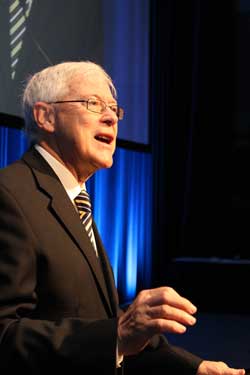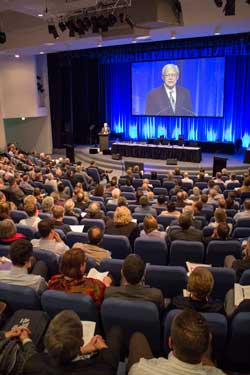Archbishop Peter Jensen, in his final Presidential Address, has challenged the diocese to continue the diocesan mission and look towards 2060.
With an initial theme of 'Last Words', the Archbishop quoted famous final phrases and then looked at the progress of the mission.
"Ten years ago in obedience to the Lord we bound ourselves to our ten-year Diocesan Mission. Under God, what have we done? What have we learned? And most important, what now? What of our future? To this Mission and its future I dedicate these Last Words" the Archbishop said.

"We gave ourselves a big goal, to reach at least 10% of the population in 10 years" Dr Jensen reported that the last decade had been one of blessing. "The 10% has been a blessing: we are constantly reminded to pray, as only the Lord can move like that; he has kept before us the big goal of reaching the whole population; He has changed our mind-set about evangelism and church ministry. He has yet to give us 10% of the population, but, remarkably, in contrast with voluntary organisations in general, we have experienced numerical growth. How has the Lord has blessed us? As I think of our four policies, to preach and pray, to plant and penetrate, to multiply and train, to reform, I see significant progress on all fronts."
The Archbishop reported numerical progress with individuals, but also the number of fellowships started.
'In a period when there were fewer nominal Anglicans and where the general tendency in various mainstream denominations has been a marked numerical decline, we have continued to grow. As far as we can tell the growth during the decade has been approximately 7.1%, from 75,000 to 80,000 regular attenders. The experts tell us that by comparison this is quite notable' Dr Jensen said.
On church planting, he said "As far as we can tell....there have been 109 new church plants and congregations and at least 105 other groups initiated. I am glad to report also that a number other groups and plants have closed. It would be monumentally foolish to persevere with something which does not work. But what we have here is a record of an unleashed initiative on a large scale unprecedented in 60 years at least."
Multicultural Ministry
A particular joy to him, the Archbishop said, was the number of new parishes and especially specialised ethnic ministries. "For years we have been gently stagnating at around 260 parishes, quietly amalgamating the dying ones, leaving suburbs unpastored and letting buildings go. We have now begun to go forward, refusing to close parishes or amalgamate them without the hope of re-opening them in the future, finding new congregations and uses for buildings and doing what we had forgotten to do – inaugurate new parishes. This changed mind-set must be permanent. Even better news. We have seen our responsibility for our neighbours from all nations. In 2002 we had an impressive 18 ethnic congregations. In 2012 we have 60! I cannot tell you how excited I was to attend the birth of our sub-continental evangelistic fellowship."

Secular media highlighted the Archbishop's comments about what he called 'deadly individualism'. He cited the playing of Frank Sinatra's 'My Way' at funerals as a symptom of this. "Individualism is made possible by material wealth and technological mastery. It seems that we simply do not need each other as once we did. Nor do we need God. To think that a person is so proud of the phrase, ‘I did it my way’ that they would use it as a summary of their life’s achievement reveals an astounding moral ineptitude, a sort of vulgar egotism. But it actually makes spiritual sense. The moral ineptitude rests on a profound spiritual rebellion against the living God. Our business as humans is ‘thy will be done;’ we have made it ‘my will be done.’ Worldly wealth and mastery makes this plausible.'
On marriage and family, he said "The benefits of stable and loving family life are so huge that any society which does not aspire to it and enable it, is courting and experiencing the general judgement of God. But the prevailing philosophy of individualism has wrought its malign work on family as elsewhere. At the heart of family is marriage, understood as the union of two persons of the opposite sex from different families by way of promises of permanence and exclusion. If the promises reflect, as they do in the Book of Common Prayer, the differences between man and woman as well as the equality, it is always to be understood that the headship of the man brings with it the awesome responsibility to nurture and cherish as Christ loved and cherished his church."
The next step
Dr Jensen will retire when he turns 70 next July. An election synod in August 2013 will choose the next Archbishop.
On the future, Dr Jensen said the mission must continue.
"The Diocesan Mission does not belong to the Archbishop. I did not invent it. We should not think of this as something that an Archbishop does – it belongs to us all. Already and rightly the Mission Board is working on the question of what we have learned and what comes next. Much of what we have done is right. We need to keep the momentum going, not start again from scratch or abandon it at this point. What we are doing is not for the short term – we must plan ahead to at least 2060 for a start."
Reaction
The synod venue, Wesley Mission and the public gallery was packed. Synod members stood and sang "Jesus, the name high over all" after the Archbishop finished speaking.
The rector of Jannali, Neil Fitzpatrick described the address as inspiring. "I was very encouraged and inspired by Peter's talk… inspired to keep preaching the gospel and very thankful to God for Peter's leadership over the last 10 years. I think the challenge is to keep faithfully preaching the gospel in the world of individualism, in the world where there are loud voices opposing it, to keep faithfully proclaiming the gospel and keep believing the promise of Jesus that is with us to the end of the age."
Sandy Grant, the senior minister at St Michael's Cathedral, Wollongong, said "Probably the bit that struck me the most was… he wasn't calling us really to analyse our success or our failures at this point but to thank God for blessings, they weren't success as much as blessings. That's an appropriate thing, the thanksgiving goes to God and not so much to a particular strategy or to his leadership or anyone else really."





















